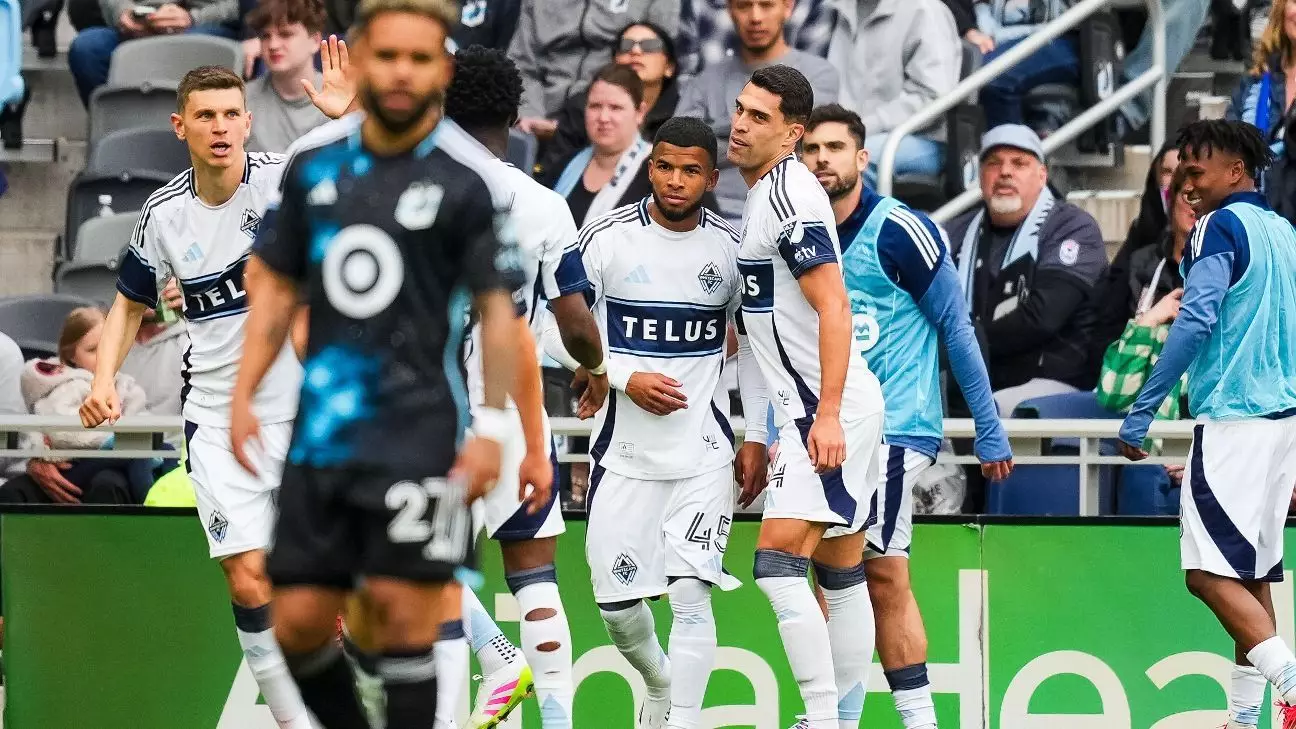In the world of sports, moments of tension can sometimes escalate into situations that reveal deeper societal issues. A recent match in Major League Soccer (MLS) between Minnesota United FC and the Vancouver Whitecaps showcased just such a moment, with implications that extend beyond the confines of the pitch. During the closing minutes of the game, in the 95th minute to be exact, a confrontation between players sparked allegations of a violation of the league’s Non-Discrimination Policy. The incident has drawn attention to ongoing challenges that the league confronts regarding player conduct and the necessary measures to promote inclusivity.
Television broadcasts caught Minnesota’s Joseph Rosales in a heated verbal exchange with Vancouver’s Emmanuel Sabbi, which soon escalated as teammate Sebastian Berhalter joined in. Despite the visible intensity of the situation, referee Drew Fischer opted not to issue any immediate sanctions, suggesting that he could not verify the claims surrounding discriminatory language. Indeed, such a decision raises important questions about the systems in place for policing player conduct in real-time.
The League’s Response to Allegations
In the aftermath of the incident, the MLS announced its commitment to a thorough investigation, publicly affirming its stance against discrimination and harassment. This response is crucial, as it signals to the public that the league recognizes its responsibility to ensure a safe and respectful environment for all participants. Minnesota United also issued a statement, emphasizing its disapproval of discriminatory behavior and affirming that they will cooperate fully with the league’s review. This collaboration is commendable as it highlights a unified approach to tackling discrimination within the sport.
Such proactive measures are essential, particularly given that this is not the first time MLS has grappled with incidents of a similar nature. In recent years, notable suspensions have been handed down to players found guilty of using discriminatory language. The league’s past actions underscore the importance of accountability, in addition to highlighting a troubling trend in disrespectful conduct among athletes.
Historical Context and Ongoing Struggles
MLS has a history of publicly grappling with issues of discrimination. The league’s concerted efforts to confront such challenges in recent years have included implementing training programs designed to educate players about acceptable behavior and avoid escalation of racial slurs or discriminatory comments. This initiative, developed in partnership with advocacy group Black Players For Change and the MLS Players Association, purportedly aims to bridge cultural gaps and enhance understanding among players from diverse backgrounds.
While the intention behind these efforts is commendable, one cannot help but question their efficacy when incidents like the one at Sunday’s game continue to emerge. The need for a transformative culture within the league is evident; training is one important step, but it must translate into meaningful change on the field. The incidents described not only bring to light a persistent problem but also challenge the league to evaluate whether its measures are sufficiently robust to create a genuinely inclusive environment.
Support from the Community and Beyond
The implications of discrimination in sports can extend beyond the players themselves, reverberating through entire communities that rally behind their teams. MLS’s initiatives are vital not only for maintaining integrity within the league but also for fostering a culture where fans and aspiring players feel welcome and respected. Soccer, as a global sport, resonates in many communities, and discriminatory actions can alienate fans, tarnishing the game’s spirit.
Support from fans is crucial in this battle. Communities can unite to demand accountability and encourage a culture of respect by supporting players and leagues that stand against discrimination. Translating outrage into advocacy can drive real change, as audiences become allies in confronting bigotry in its various forms.
The situation arising from the Minnesota United and Vancouver Whitecaps match heralds a moment of reflection—soccer is not just a game but a mirror reflecting the society that plays it. If MLS is willing to confront these uncomfortable truths honestly and openly, it stands a chance to produce a more inclusive and respectful environment for everyone involved. Only time will reveal whether the league’s investigations and initiatives will lead to the meaningful reform needed to eliminate discrimination and create a safe sporting environment for all.

